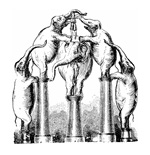
Why the Left Rules the Rhetorical Battlefield
CONSERVATISM'S "UNFORTUNATE REFORMATION"
Earlier this year, popular talk-show host Rush Limbaugh declared that “nationalism and populism have overtaken conservatism in terms of appeal.” Though he retreated from these comments a few days later, saying, “I do not believe nationalism and populism have usurped conservatism,” the damage was done: A onetime neoconservative apologist not only implied the end of establishment conservatism as a viable political force capable of confronting the uncertainties of globalized modernity, but he cited a paleoconservative commentator, Sam Francis, as an authority in explaining the continued popularity of prospective Republican presidential candidate Donald Trump.
Conservatism, like contemporary Western civilization itself, seems to be in eclipse. But this is so only because its advocates cannot, or refuse to, speak on their own terms; instead, they accept the moral authority of leftist ideologues and thus handicap their own putative opposition to militant progressivism. Those on the so-called Dissident Right constantly remind their detractors that the present stewards of mainstream conservatism have repudiated their forefather’s legacy. These warnings are, however, almost universally dismissed in terms identical to the broader Left’s pejorative treatment of conservatism itself. Instead, mainstream conservatives declare that their fealty to liberal ends is more sincere than that of their explicitly leftist opponents. While it is easier to identify these trends in the more theatrical political culture of the United States, the moral bankruptcy of establishment conservatives can be found in Center-Right parties throughout the Anglosphere. An example from Australia illustrates that the nearly universal assumption of leftist morality may have thrust conservative thought over the event-horizon, beyond which it is conceptually indistinguishable from the progressive worldview.
+++
“Tony Abbott just called for both a Reformation and a revolution ‘within Islam.'” So writes Waleed Aly, a Muslim-Australian spokesman on multicultural affairs and lecturer of politics at Monash University (Sydney Morning Herald, Dec. 10, 2015). Former Prime Minister Abbott delivered his comments, which largely echoed a similar call by Ayaan Hirsi Ali, during a discussion concerning the compatibility of Islamic culture and modern Western society. Anglo multiculturalists, who believe almost religiously in the inviolable sovereignty of all cultures but their own, were quick to attack Abbott for his offensively “Eurocentric” faux pas and the neocolonial temerity with which he dared to lecture “the Other.” Yet this was no ordinary example of xenophiles pillorying a public figure for offending contemporary progressive sensibilities on cultural identity and religion. Abbott’s comments, as well as the predictable reactions to them, showed that both sides of the culture war have engaged on the Left’s chosen field of rhetorical battle.
Contra Abbott, Waleed Aly explains that Islam already underwent a “reformation” in the tenth century, when the jurisprudential doctrines of Ijtihad and Istihsan (independent and preferential reasoning, respectively) were eclipsed by Taqlid (blind obedience to scripture). Moreover, Aly intimates that this was historically antecedent to Islam’s present difficulty in facing a world defined by a post-Christian secular ideology, its technocratic and managerial theory of governance, and the liberal, universalist biases that accompany it. From Wahhabism to the foundation of the modern state of Saudi Arabia, from anti-colonial Islamism to contemporary manifestations of international jihad and the so-called Islamic State — by illustrating the continuity of these developments as a function of this supposed reformation, Aly reveals the ultimate folly of applying Western concepts to the historical experience of foreign cultures and the silliness of expecting similar sociological outcomes as a result. “This is, of course, perhaps the most well-worn and ill-informed cliché of Western discourse on Islam,” he writes. “The kind of thing people like to say when they want to sound serious but know almost exactly nothing about Islam, Muslim societies, or indeed the [Protestant] Reformation.”
You May Also Enjoy
When considering Muslim tolerance, one might inquire: Are Muslim attitudes toward drinking alcohol tolerant? And how about free speech? Women's rights? Freedom of religion? Music and Art?
As a practice of personal piety, the laity may use the posture of prostration as an expression of humility only in private.
Apathy and passivity are not the characteristics of civilized people. They are marks of submissive people who invite an authoritarian regime to control their lives.

